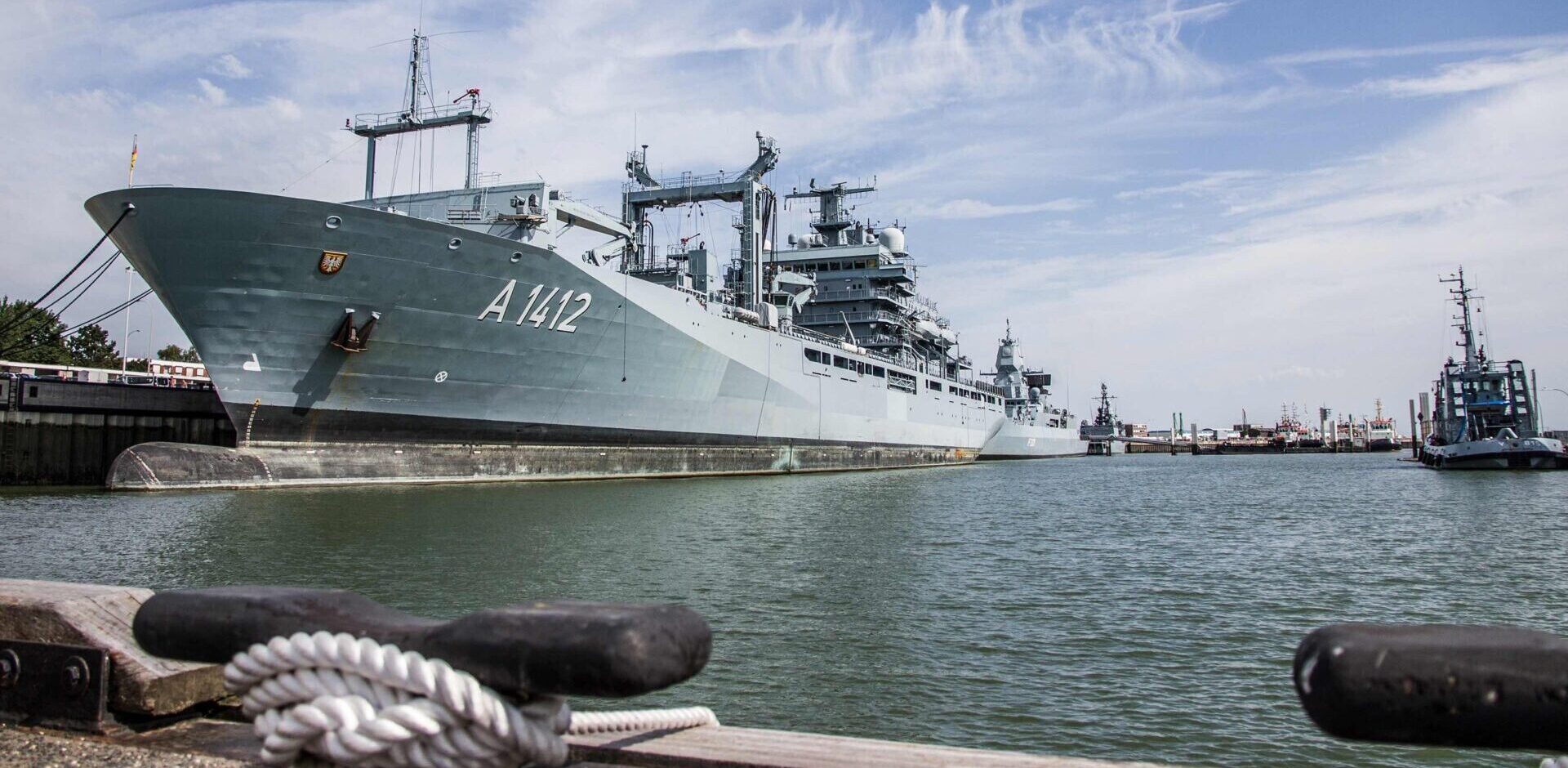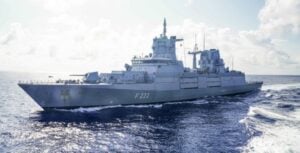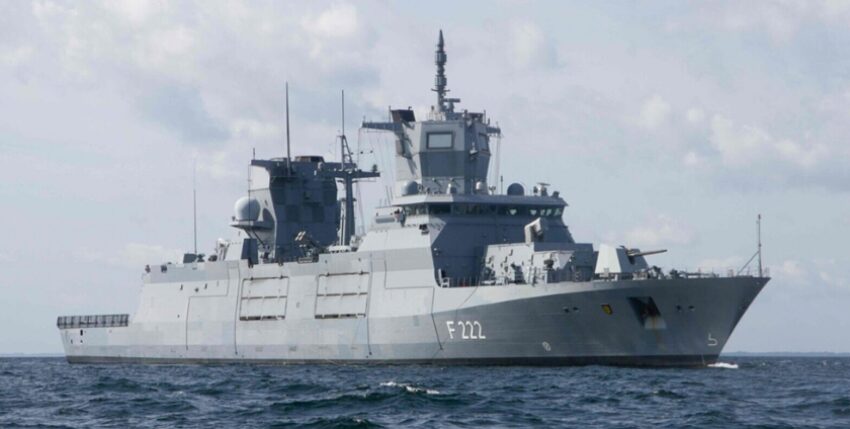An explanatory piece - from the pier.
The question of whether the German Navy's Indo-Pacific convoy, consisting of the frigate "Baden-Württemberg" and the task force provider "Frankfurt am Main", should sail through the Red Sea on the way back from its world tour has been raised since the convoy left port on 7 May 2024. It was foreseeable for naval officers that no such passage would take place without an end to the Houthi threat. The decision therefore came as little surprise to the navy and its experts.

From the beginning: The world watched in horror as Hamas attacked Israel on 7 October 2023. From November 2023, the Houthis targeted ships of the pro-Israeli Western world. Yet another war and its consequences fell at our feet. And the "Ever Given" accident had already shown us what the closure of the Suez Canal meant. The EU responded: with Operation European Union Naval Force - Aspides (EUNAVFOR Aspides), it was decided in December 2023 - in cooperation with the US-led Operation Prosperity Guardian - to respond to the attacks by the Huthi-rebels to react. Germany successfully participated from February 2024 with the frigate "Hessen" (marineforum reported "Hesse" on fire - what you can say about it "from the pier"). The other German contribution was to be made by the frigate "Hamburg". Although the ship is operating in the Mediterranean, it is tied up in the sea area off Lebanon. The Greek commander of the operation, Flotilla Admiral Vasileios Gryparis, rightly criticises the fact that he has too few ships at his disposal to protect the merchant ships in the Red Sea. Nevertheless, the operation has so far succeeded in escorting over 200 merchant ships through the Red Sea and destroying around 20 drones and anti-ship missiles.

The consequencesThe seriousness of the attacks was demonstrated, for example, by the Liberian-flagged tanker "Olympic Spirit", which was hit by eleven missiles and two drones. In August, it was feared that there could be an oil spill because the "Sounion" with 56,000 tonnes of oil on board had caught fire as a result of an attack. Allianz Commercial reports that more than 50 merchant ships have been attacked by the Houthi rebels in the Red Sea so far. At least a dozen have been killed. The decline in traffic through the Suez Canal is assessed differently. Shipping companies speak of 40%, experts of up to 80%. The number of ships taking the route around the Cape of Good Hope has tripled. The transit around Africa extends the journey by almost two weeks. This has an impact on supply chains, prices, production processes and port utilisation. It remains to be seen whether the assembly cancellations at Tesla will really affect us.
"Ship in short supply": This was the headline in Der Spiegel at the end of October, referring to Greek Admiral Vasileios Gryparis, who is calling for at least ten warships for Operation Aspides. The commander complained that the huge operational area could not be covered with three ships. What Spiegel was not told, however, was the number of ships actually required and their necessary capabilities. If you want to have ten ships in action at all times, you need three times that number in the deployment - maintenance - training rotation. However, there are not that many warships suitable for this operation in the whole of Europe. The situation is similar with the Maritime Patrol Aircraft (MPA). As always, too little of everything.
SkillsThe countdown of the warships of the participating EU states is followed by disillusionment. There are ships, but they are all specialised: should they fight against submarines, attack surface targets or fend off threats from the air? A distinction must be made between whether a ship can fight in these three dimensions not only for itself, but also to protect third parties. This ability, known as "formation protection", is what makes up the mix of fleets. In the case of Operation Aspides, it's not just a question of a ship's own air defence (not "air defence", please, there's no such thing!), but of air defence, i.e. protecting third parties against attacks from the air. The Germans have three ships of the Sachsen class, the Dutch have four of the De Zeven Provinciën class, France and Italy each have two of the Horizon class, plus the two new French frigates of the FREDA class. Including? 13 units! However, none of these ships are fully prepared for the current scenario, because when these ship classes were designed 15, 20 and even 25 years ago, defence against Huthi drones and anti-ship ballistic missiles were not yet included in the specifications.
The HuthiThe Houthi militias wish death on the USA and Israel - they invoke Allah and the victory of Islam. But these so-called rebels should not be underestimated: They are not a sandal-wearing bunch of fanatics with headscarves and shotguns. We recommend reading Powder keg Red Sea. There are up to 180,000 troops, some of them well-trained and experienced, organised in a structured manner. They are supported and supplied by Iran, have access to modern technologies and are indirectly involved in the government in Yemen. In return, the Huthi illegally transport Iranian goods and thus undermine sanctions.
And now? The decision has been made, the Indo-Pacific Association will therefore take the route around the Cape of Good Hope. Der Spiegel was the first to report that the decision was made last Monday by Federal Defence Minister Pistorius. As expected, the self-confident faction of smart alecks commented indignantly. We firmly believe that these same people would have been just as upset if the unit had taken the route through the Red Sea. But then they would have written about irresponsibility and a suicide mission. We've already been through that.
Conclusion: A task force provider cannot protect itself comprehensively per se, this is due to its design. The Class 125 frigate is not an air defence ship and was built for other scenarios. What is cowardly about evading an opponent who is firing missiles and drones at you almost undisturbed, but you cannot engage him in battle? The attacker is cowardly. There are too few ships, too little ammunition, hardly any reserves and a shortage of money and personnel, not only in Germany but throughout Europe. That is worrying. The claim to protect the sea lanes and thus justify a navy is also severely undermined by this measure. The escalation must also be weighed up, as the Houthis would probably have given their all because both ships would undoubtedly have been prestige targets. The armament of the German IPD units had been provisionally upgraded in advance, from Iris-T to Mantis. In the end, the calculation of making only the navy look humble rather than the entire state probably prevailed.
After all, Boris Pistorius has not had to mourn any fallen soldiers during his time in office and certainly wants it to stay that way. It is the highest commandment of a state to protect its citizens. This also includes not endangering soldiers without good reason. And he is sure to meet with the approval of the majority of the German population, especially the families and dependants of the association's soldiers.
Author: Stephenson / Schlüter
Note: in a previous version, we also succumbed to the seduction of social media. Here is the shortened version.








13 responses
Did anyone really believe that the threat in the Red Sea and the eastern Mediterranean would disappear into thin air by the time the Indo-Pacific convoy arrived - certainly not. According to this, the route planning should have been changed before departure, which would have spared our navy and above all the crews concerned humiliating comments.
Dear Editor,
I have finally read the article to the end and think it is absolutely on point. It deserves exactly the intro! Anyone who reads to the end will understand. Unfortunately, there are always consumers of relevant popular media and social media channels who only read the headlines and then spread hate and fake news. They absolutely deserve this message.
Excellent commentary and backed up with facts! - But the species of "know-it-alls" will not die out and will continue to let off steam with their dangerous and nonsensical "technical half-knowledge", because they have nothing else to say.
"...because when these ship classes were designed 15, 20 and even 25 years ago, the defence against Huthi drones and anti-ship ballistic missiles was not yet in the specifications."... says the otherwise pleasantly calm and accurate article. But on this very point, it should not be forgotten that the German Navy did not follow the Dutch when their navy upgraded the De Zeven Provinciën class, which is similar to the F124, to BMD capability, probably due to notorious cost-cutting constraints and/or political considerations. MF author Andreas Uhl reported on this very competently at the time. Spilt milk, I know - but equipped like this, they would have been able to use FGS HAMBURG instead of the ship
to "park" it in the eastern Mediterranean, possibly with fictitious tasks, to send it to the Indo-Pacific Association and let it perform the task in which it specialises: association protection
That's exactly how it is - if you put yourself in danger, you will die.
And in general, far too much is passed on to the public.
All the despots in the world are laughing at us.
Much more must remain secret, also to protect our soldiers and those of our allies.
It is noticeable that Germany no longer has any destroyers but only frigates that are only equipped for certain scenarios (submarine hunting, air defence, etc.). So it was right to avoid the Red Sea and favour a safe route home.
I myself went to sea on destroyers of the class 103/103B and we had the right sensors and effectors for any threat.
The EGVs were originally supposed to be equipped with RAM starters at the bow and stern for self-protection. Politicians never made the necessary money available for this. It was similar with the new frigates, where only the RAM launchers were installed for cost reasons and no further-reaching air defence. These are all hair-raising mistakes by our politicians. The current decision is understandable, but it is still embarrassing for our country
Very good contribution. I fully agree. But two comments from me. Firstly: Europe would be well advised to strengthen its navies for missions to protect European approaches and to broaden the deployment of weapons platforms. Secondly, no one seems to be thinking of responding to the dangers in the Red Sea with an ad hoc programme. For example, instead of decommissioning some older floating units, retrofitting them with armaments appropriate to their tasks and deploying them to the Red Sea. A mixed formation of "new" and "retrofitted" units.
Almost everything about the comment is wrong... if a naval unit of the German navy cannot protect itself against a gang of Iranian proxies in a part of Yemen that they brutally rule in the style of the Mullah Islamists in Tehran, the Houthi terrorists, what role did it have in the Indio Pacific?
With an expected adversary like China , protecting the sea lanes in Asia , together and as guests of Japan Taiwan South Korea Philippines Australia, should he demonstrate Europe's incompetence to our allies in Asia?
There is no doubt that the minister wanted to avoid the risk and that the sailors on the ships were happy to get home safely.
But cheap fame in Asia, because nothing will happen there, but real attacks on our economic lifelines, not being able to secure the sea routes there?
This is where the writer's mistake lies, with all understanding, it was not an already insignificant navy that humiliated itself further, Germany was humiliated by its navy, in Asia and in the Red Sea.
If the competences are as specialised as described, which may well be the case, thank you cdu / csu / FDP, they should avoid the deep water until functioning ships are available or quite competent German u boats do the work, even if they are not so pompous in the harbours for the parade, with neat white uniform and fluttering pennants, more efficient and German than this action.
All correct. But please also think politically: if you want to show your colours in the Indo-Pacific region, it is incredibly negative if you tuck them (and your tail) where the public eye is directed. Note: "Specialist circles" in particular tend to view things with a limited horizon. This used to be called blindness.
The impression that the navy of one of the world's largest industrialised nations is evading a bunch of rampaging pirates is, of course, devastating. But I can understand why people don't want to risk scarce resources on such a skirmish.
This makes it all the more clear how much the West has exposed itself in military terms in recent years. In the future, 2% of GDP will not be enough.
In principle, I see the decision as the right one, as it is due to the avoidance of an avoidable risk. Nevertheless, it holds up a mirror to the West as to where the set screws are in the maritime capabilities, especially with regard to the 125s. They are working on it with Iris TSLM. Giving in to an opponent is politically different. As long as you draw the right conclusions from this, it's all fine. Conclusion: It's not cowardly, but it shows a capability gap that needs to be closed. Also for this ship.
Very good, to the point and wonderfully witty! Chapeau, everything is right!